Rosie Greenaway learns how to combat ‘purging pits’ and takes a whiff of some surprising tinctures used in natural perfumery
Much has been written about how pheromones affect mood, behaviour and physical attraction. But ask people on the high street if the au naturel vibe floats their boat and many will balk at the suggestion. Even off the back of decreased usage during lockdown, the 2022 UK deodorants market sat at £396.4 million; of that, Sure accounts for a 31% market share [Mintel]. But we’re not here to examine the success of conventional brands; Mintel research tells us that 51% of Brits who are yet to try natural deodorant are ‘interested’ in doing so. That is objectively huge – a large, untapped portion of consumer society which just needs to be convinced that the switch will be worth it. But coaxing consumers across requires the right messaging: that patience and perseverance are key to conquering perspiration.
Born to perform
When it comes to managing sweat, different products will work for different pits. People often speak of a ‘transition period’ associated with the detox which underarms go through once an aluminium-laden antiperspirant has been swapped for a natural deodorant – indeed, many give up, too impatient to tolerate unfamiliar bodily changes. It’s certainly a teaching moment for brands and retailers who can take this opportunity to reassure the public about the efficacy of natural brands.
But as Andy Coxon, co-founder of AKT says, not everyone will experience transitory problems. “It’s not the case for everyone; some say it’s not even a thing. People who have experienced this say [it takes] two weeks to a month to really allow their body to adapt from blocking their pores for so long with antiperspirants. Everyone is different; it’s about finding the sweet spot to match your level of activity.”
It was intense physical activity which led Coxon and partner Ed Currie to formulate AKT in the first place. During their former West End careers they struggled to find a deodorant which stood up to the challenge of supporting them through eight shows a week under hot lights. They needed a deodorant which was ‘born to perform’ so they created it. “[We] needed a deodorant that matched our level of activity. That active lifestyle can only be matched with that of an athlete. Trust us. It’s been put to the test.”
If someone does have a reaction to a natural deodorant, it’s either bicarb or essential oils that are causing it
As Coxon points out, ‘armpits are super-sensitive areas’ and while AKT rarely gets negative feedback, he acknowledges it may not be a magic bullet for all sensitive-skinned customers due to the key ingredient, sodium bicarbonate. “If someone does have a reaction to a natural deodorant, it’s either bicarb or essential oils that are causing it, but not always bicarb. It’s frustrating for them because that is such an important ingredient to the efficacy of our formulation.” His advice is to play around with different amounts on the skin, give it time and see what works. If intolerance to bicarb persists, he says ‘unfortunately their search for a natural deodorant that works for them continues’.
One trick which might help overcome common barriers is a good old scrub in the tub; prepping your pits is paramount. This is where Pacifica Coconut & Charcoal Underarm Detox Scrub comes into play. On its Cult Beauty listing, shoppers can learn why it’s such a handy shower staple: “When transitioning to a natural deodorant, your underarms can often ‘purge’. By purge, we mean sweat more, which is why Pacifica has created the Coconut & Charcoal Underarm Detox Scrub; to help you glide through the awkward detox stage by swiftly unclogging skin.
“When you begin to use a natural deodorant for the first time, your body releases built-up toxins before stabilizing. This process can make you feel sweaty and uncomfortable, which is why this scrub uses gently exfoliating charcoal, antioxidant-rich green tea and soothing coconut to help unclog your pores and bring skin back into balance.”
Saying no to BO, naturally
The natural deodorant market has come such a long way that today’s curious shoppers are spoilt for choice. If a spray feels synonymous with just-out-of-the-shower-freshness they still have that option once they’ve ditched the aerosol; Haoma Organic Deodorant offers three variants to be spritzed generously onto clean skin – Fresh, Floral and Comfort (suitable for menopause).
Reliable roll-ons include GoBo – marketed as ‘Europe’s first AHA functional deodorant’ – which helps prevent ingrowing hairs and ‘painful blocked sweat glands’; MooGoo Natural Fresh Cream Deodorant – sensitive, slightly alkaline and completely aluminium-free; and Salt of the Earth, which sells Roll On Refills in a wide range of scents including Ginger & Jasmine, Melon & Cucumber and Ocean & Coconut.
For fans of bars and balms, Attitude Leaves Bar Deodorant is plastic- and baking soda-free and won’t count towards any ‘liquids and gels’ limits at airport security; and Proverb Natural Refillable Deodorant comes in three strengths to suit the user’s needs – ACTIVE for those who suffer from BO or are transitioning from an antiperspirant, CORE for those with allergies to bicarb, and SENSITIVE for delicate pits.
Also keeping a lid on sweat are: The Natural Deodorant Co for Men Clean Deodorant Balm which provides all-day odour protection in a glass jar; Awake Organics Star Cloud Deo, which comes Unscented in a pocket-sized tin; and Fit Pit Organic Deodorant Peppermint – ‘ideal for teenagers’, suitable for vegans and available in either 100ml or 25ml travel jars.
The art of perfumery
Somewhere on the rugged west coast of Ireland sits a perfume organ – a kind of tiered apothecary station which enables perfumers to formulate fragrances using base notes (positioned on the lower levels of the organ), middle notes (occupying the mid-tiers) and top notes (crowning the collection on the top shelves). Sitting at that organ is Ruth Ruane, a professional perfumer, the face behind ethical skincare brand White Witch and one half of the Natural Perfume Academy. The organ, she explains, helps a perfumer choose their notes and find inspiration.
It’s like when you’re first learning how to paint when you’re a child; you mix all the colours together and you just get this dirty brown
Perfume making is ‘tricky stuff’, Ruane explains, even for someone like her with a ‘good nose’ for scent. “You think it’s going to be easy but it’s not. It takes so long. It’s not like aromatherapy [where] you’re just blending three oils; in natural perfume you’re blending maybe 15 different ingredients. It’s like when you’re first learning how to paint when you’re a child; you mix all the colours together and you just get this dirty brown. You don’t know when to stop. You keep going and then you ruin it.”
Along with time, trial and error, it also takes knowledge. For this reason, ten years ago, Ruane co-founded the Natural Perfume Academy with Justine Crane, a California-based perfume teacher. The academy offers a nine-month course, out of which students obtain a diploma – not to mention first-class mentorship from Crane. “She’s so humble. We’ve had some fantastic perfumers come out of there and they just sing her praises. Once she sees that a student has passion … she will teach them all her secrets.”
Dirty notes
So where does one begin when creating a natural fragrance? Ruane suggests you might start with something you like – jasmine, in her case. Then it’s a case of building around the core essence with other notes which complement and balance it. She explains that Crane starts new students off with a kit of 15-20 essences ‘that are pretty easy to work with’. Rose is a common starting point – “There’s rose in probably 90% of female perfumes, because it’s a great balancer and modifier” – and sandalwood is another go-to for newcomers.
Some scents require more mastery and are best avoided when first starting out as they would ‘take over a perfume altogether’. “One that comes to mind is Africa Stone tincture. There are some crazy perfumery materials out there … this is actually tinctured poo! It comes from a little mammal. Obviously, it’s cruelty-free. I have a little bottle of it; it is so horrible! It’s used to give an ‘animal’ note. We call it a ‘dirty note’. If you used it with rose it might really exalt the rose, make the rose do something different. You would have to use it in such small amounts … dilute it down until you almost can’t smell it. For beginners, you just wouldn’t – one drop could ruin your whole perfume.”
Next she points to one of the oldest and most expensive perfumery materials: ambergris, a substance formed within whale excrement. One of the fishes commonly eaten by whales has a sharp ‘beak’ which cannot be digested in their stomachs; repeated irritation causes a resin to form which eventually passes through the intestines. “It’s absolutely amazing. The ocean washes away all the poo and you’re left with this lump of resin. You can train your dog to find it on the beach. It’s worth £99 a gram. If you put a hot needle into it, it’s like tar – that’s how you test it to see if it’s ambergris.”
But why use something that smells like cow dung in perfume? Ruane says that despite its ‘faecal note’ ambergris has for centuries been added to make perfume last longer. “You can even put it on under your perfume and it makes the perfume jump off your skin and throws it out into the air.”
So when you’re next passing someone in the street whose perfume over-powers you, it’s likely to contain ambergris, or at least its synthetic equivalent.
Stay away from the spray
If ever a story should coax people away from aerosols it’s that of Giorgia Green, a 14-year-old who died after inhaling aerosol deodorant in 2022. Green, who had autism, associated the deodorant with her mother, so would spray it onto blankets for olfactory comfort. Following this tragedy, her parents called for clearer labelling about the potential dangers of aerosols, saying the warnings are printed too small.
Ashley Martin, public health advisor, Royal Society for the Prevention of Accidents, says it’s a common misconception that ‘fatalities from aerosols only happen in a substance abuse scenario’. “This is absolutely not true. We have seen a number of fatalities over recent years where children … have over-sprayed aerosols – from teenagers conscious of body odour, to children seeking reassurance from familiar scents. Inhaling large quantities … can lead to a whole host of life-endangering scenarios – from blackouts and breathing difficulties to heart rhythm changes and, sadly, death.”
The alt-perfume counter
Natural perfume is a blossoming category, peppered with price-accessible brands such as Scotland’s Flaya, certified vegan and organic; Lamazuna, known for its refillable COSMOS Organic solid perfumes; and Love Organic Fragrance which sells 10ml sizes for those just venturing into cruelty-free cologne.
But what’s happening at the premium end of the alt-perfume market? Creating ‘the world’s first carbon-negative fragrance’, Air Company is making what it calls ‘a revolution in scent science’ by ‘turning the Earth’s excesses into something beautiful’. With top notes of orange peel and fig leaf, heart notes of jasmine, violet and azalea, and base notes of powdery musk and tobacco, AIR Eau de Parfum is a genderless scent ‘inspired by the elements’. The future of fragrance it may be, but it retails at a staggering $220.
At a pinch less – £140 – Margate-born Hæckels focuses on ‘trying to solve the waste problem’ and uses handpicked seaweed as a base. The B Corp brand pinpoints the exact date of creation – for example, the seaweed, white flowers and saltwater used for its vegan Walpole Parfum were all collected on a sunny day in March 2014.
Bewitched by fragrance since childhood, Heretic Parfum’s founder Douglas Little aims to ‘show the provocative side of naturals and the dirty side of clean’. Heretic explores the ‘unpolished version’ of plants from dirt to stem to petals, ‘with all their organic imperfections and earthly beauty intact’. The result: ‘a vastly different experience than people are used to when wearing synthetic perfume’.
Fighting against the lack of transparency in the fragrance industry, Abel publishes its full list of ethically sourced ingredients – each of which ‘started life as a plant’. The brand chooses natural ingredients ‘for their olfactory beauty and their therapeutic, mood-enhancing qualities’ and shuns any type of fossil fuel-derived synthetic molecules. Abel has a ‘trying and sometimes failing’ tab on its website where customers can read an honest account of its sustainability journey.
The Nue Co’s Functional Fragrance is a non-toxic collision of perfume and stress management. “Scent is one of the fastest ways to bring back a feeling of calm. Functional Fragrance is a sensorial supplement that targets an overworked brain via your sense of smell … [bringing] you back to a more grounded emotional state,” says the brand.
Medeau describes its Cedar Noir as an ‘edgy, pacey and exciting’ unisex pheromone-reactive Eau de Parfum which ‘collaborates with the wearer’s unique chemistry’. An initial hit of black pepper is followed by geranium and bergamot, before you’re drawn ‘into its hot heart of cedarwood and vetiver’.
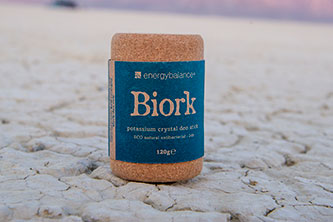 Biork – the real Eco Deodorant
Biork – the real Eco Deodorant
Biork Switzerland
Tel: 00 41919428888
E-mail: [email protected]
www.biork-deo.com
Sweating is a natural occurrence, but it doesn’t have to be a smelly one. Biork Deo is the perfect option for anyone looking for an all-natural and ecological deodorant. Unscented and hypoallergenic, this truly eco deodorant is housed in a 100% recyclable and biodegradable cork container. Their natural formula is easy on the skin and free from harsh chemicals, so you can feel good about what you’re putting on your body. Biork is certified according to Cosmos Natural Cosmetics. With its natural and effective ingredients, it is the perfect choice for anyone looking for a deodorant that actually works and lasts over one year.
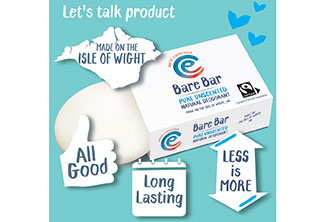 Earth Conscious ALL GOOD natural deodorants are made in the UK on the beautiful Isle of Wight.
Earth Conscious ALL GOOD natural deodorants are made in the UK on the beautiful Isle of Wight.
Instagram: @EarthConsciousUK
Deodorise and moisturise with natural, organic ingredients harnessing antibacterial properties to keep you fresh all day long whilst being kind to your body & the environment. Choose from a compact cardboard easy to apply Natural Deodorant Stick, a balm in a recyclable or reusable tin or an essentially naked Bare Bar available with a refillable storage/travel tin.
The entire collection is plastic-free and designed with a minimal waste mindset to reduce packaging pollution and the negative impact on our seas and wildlife. Many of the products are certified Fairtrade with more rolling out in the coming months. 10p from every product sold goes to the Marine Conservation Society, a UK charity protecting our seas, shores and wildlife.
Vegan Approved by the Vegetarian Society and endorsed Cruelty-Free by the Leaping Bunny programme.
Follow the team on Instagram @EarthConsciousUK where they share their love of the Isle of Wight.
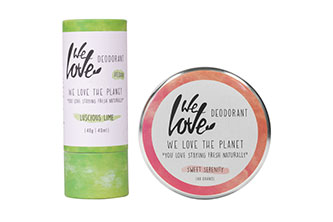 We Love the Planet Deodorants
We Love the Planet Deodorants
Kinetic Natural Products Distributor
Tel: 08450 725 825
E-mail: [email protected]
www.kinetic4health.co.uk
Bestselling deodorants from We Love the Planet: plastic-free, zero waste and recyclable packaging. Available in 8 different “fragrances” including a fragrance-free and baking soda-free So Sensitive option and two vegan options, one of which is also formulated without baking soda. Made from 100% natural origin ingredients, the core range is based on a combination of coconut oil, beeswax and cornstarch powder to offer a smooth application, baking soda to neutralise odours naturally, and essential oils. The deodorants are packaged in either a snaplock tin (48g) or a wide-opening biodegradable and compostable cardboard tube (65g). www.kinetic4health.co.uk
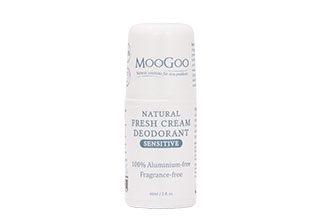 MooGoo Fresh Cream Deodorant – Sensitive
MooGoo Fresh Cream Deodorant – Sensitive
MooGoo Skincare
Tel: 0800 4346606
E-mail: [email protected]
www.moogooskincare.co.uk
A best seller – award winning MooGoo aluminium-free, roll-on, natural deodorant with a slightly alkaline formula that prevents odour causing bacteria from growing. Free from over-powering essential oils that mask odour and can cause irritation and scent free for sensitive skin, gentle enough to use for Oncology Care. Naturally preserved with Hops Extract – free of Parabens and Phenoxyethanol.
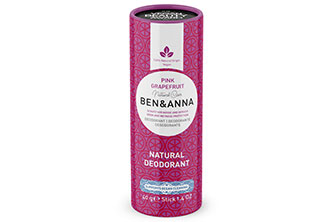 Ben & Anna Pink Grapefruit Deodorant Tube
Ben & Anna Pink Grapefruit Deodorant Tube
Pravera Ltd
E-mail: [email protected]
www.praveratrade.co.uk
Be ready for whatever the day throws at you with Ben and Anna’s deodorant in Pink Grapefruit. This must-have deodorant has a zesty smell that makes you feel invigorated and fresh, gliding onto the skin due to the shea butter, leaving your skin soft. Certified natural, vegan, eco-friendly and effective, it ticks all the boxes.
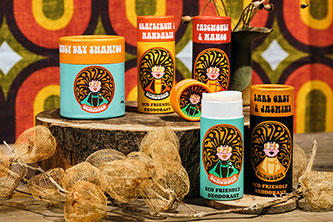 Scrubber Natural Deodorant & Scrubber Dry Shampoo
Scrubber Natural Deodorant & Scrubber Dry Shampoo
Scrubber Store Ltd
Tel: 07856 701116
E-mail: [email protected]
www.scrubber.store
We started Scrubber with one purpose in mind – to make ethically produced and eco-friendly personal care products more affordable and accessible to all. We’re a family owned and operated business, hand mixing and pouring each tube right here in London, England.
All Scrubber products are handmade in London from natural ingredients – no aluminium, no sulphates, no parabens. All ingredients are ethically sourced from fair trade sellers and are 100% vegan and palm oil free. All of our packaging is plastic free and recyclable.
Our deodorants are available in 4 fresh, unisex scents as well as an extra sensitive skin option.
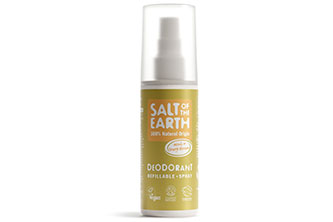 Salt of the Earth refillable Neroli & Orange Blossom Spray Deodorant
Salt of the Earth refillable Neroli & Orange Blossom Spray Deodorant
Crystal Spring Consumer Division Ltd
Tel: 023 8026 7143
E-mail: [email protected]
Fragranced with top notes of orange and lime and base notes of neroli, the new certified vegan spray deodorant from Salt of the Earth keeps you smelling great all day. Its quick drying, COSMOS certified all-natural formula is kind to the skin and has extra moisturising ingredients to keep the delicate armpit skin soft and free from irritation.
Refill this clever 100ml spray deodorant time and time again by purchasing a refill bottle of 500ml (RRP £24.99), which fills the roll-on deodorant up to 5 times. This offers a 60% reduction in plastic packaging, when comparing 1 refill bottle with 5 spray deodorants.











